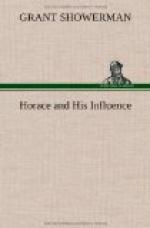It is not impossible, also, that the musical debt of the world to Italy is in a measure owing to Horace. Whether the music which accompanied the Odes as they emerged from the Middle Age was only the invention of monks, or the survival of actual Horatian music from antiquity, is a question hardly to be answered; but the setting of Horace to music in the Renaissance was not without an influence. In 1507, Tritonius composed four-voice parts for twenty-two different meters of Horace and other poets. In 1526, Michael engaged in the same effort, and in 1534 Senfl developed the youthful compositions of Tritonius. All this was for school purposes. With the beginnings of Italian opera, these compositions, in which the music was without measure and held strictly to the service of poetry, came to an end. It is not unreasonable to suspect that in these early attempts at the union of ancient verse and music there exist the beginnings of the musical drama.
ii. IN FRANCE
France, where the great majority of Horatian manuscripts were preserved, was the first to produce a translation of the Odes. Grandichan in 1541, and Pelletier in 1545, published translations of the Ars Poetica which had important consequences. The famous Pleiad, whose most brilliant star, Pierre de Ronsard, was king of poetry for more than a score of years, were enthusiastic believers in the imitation of the classics as a means for the improvement of letters in France. Du Bellay, the second in magnitude, published in 1550 his Deffence et illustration de la langue francoyse, a manifesto of the Pleiad full of quotations from the Ars Poetica refuting a similar work of Sibilet published in 1548. Ronsard himself is said to have been the first to use the word “ode” for Horace’s lyrics. The meeting of the two, in 1547, is regarded as the beginning of the French school of Renaissance poetry. Horace thus became at the beginning an influence of the first magnitude in the actual life of modern French letters. In 1579 appeared Mondot’s complete translation. The versions of Dacier and Sanadon, in prose, in the earlier eighteenth century, were an innovation provoking spirited opposition in Italy. The line of translators, imitators, and enthusiasts in France is as numerous as that of other countries. The list of great authors inspired by Horace includes such names as Montaigne, “The French Horace,” Malherbe, Regnier, Boileau, La Fontaine, Corneille, Racine, Moliere, Voltaire, Jean Baptiste Rousseau, Le Brun, Andre Chenier, De Musset.
iii. IN GERMANY




